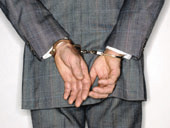Alan Day of Transport for London chairs the London Fraud Forum (LFF). He answers some questions ahead of the LFF’s annual conference at One Great George Street, London SW1, on Thursday, October 4.
To satisfy nosey readers, can you tell us a bit about your background and fraud work. I am the chair of the London Fraud Forum and have been so since its inception in June 2005. My ‘day’ job is the Senior Audit and Investigations Manager – Fraud and Security at Transport for London (TfL). This is fascinating work and TfL is an exciting organisation to work for especially as we approach the Olympic and Paralympic Games. I have been in this position for just under nine years and have seen all types of fraud from serious contract fraud to overtime fraud and organised criminals targeting the London transport system. But as important as investigation is raising awareness of fraud and fraud prevention. This is where my involvement with the LFF helps as it provides the vehicle in which to meet other counter fraud professionals, to share best practice and ideas and to learn about emerging fraud threats.
In October you have a speaker from the Cabinet Office ‘Behavioural Insights Team’. Their ideas were featured in the April issue of Professional Security. Are they on to something with this idea of ‘nudging’ people to stay honest, or is there no substitute for plain investigation and putting people in the clink, or a bit of both?! ‘Plain investigation’ and imposing the most suitable sanction are of course vitally important. But these are just one part of what should be a compete counter fraud process. As I said, awareness and prevention are also essential and if we can change people’s attitudes to fraud, both the criminal and the victims, then this will help in the fight against fraud. Some very simple changes can have quite significant results as some of the work the Cabinet Office Behavioural Insights Team have found and that is why we were keen to have them present at our conference and share their knowledge with the membership.
You also have a National Fraud Authority speaker. Their latest estimate of UK fraud has shot up to £73 billion. Are fraud people still having to bang their heads against a proverbial brick wall to get fraud taken seriously, or is it easier in a recession?! I think the attitude to fraud has come a very long way over the past few years. It is now, quite rightly, no longer seen as simply a ‘white collar’ crime but one that affects all society. Indeed, we have seen criminals targeting the most vulnerable in recent years. But that does not mean that everyone is converted. There are some who still think that fraud does not concern them. How often do you hear from someone who, after a fraud has been uncovered, say that they thought the culprit was ‘up to no good’ but did not report their concerns. Therefore we still have a lot of work to do to ensure more people are aware of the fraud risks in their particular area and are aware of what to report and to whom.
I suspect many or most of our readers will not be fraud specialists; could you, a fraud specialist, advise whether or to what extent the security manager in an organisation should carry out a fraud investigation, or look to bring in police or auditors or consultants to do the work? This must be in accordance with your own company policy. Some organisations, like my own, are lucky enough to have a fraud team that have the ability (training and resources) to conduct internal investigations. Other companies do not. I would advise that if you do not have trained investigators who understand both investigation and fraud, then it would be wise to call in assistance from outside of the organisation. But this is also true of looking at your fraud risk. You need to be aware of what types of fraud could occur in your business and have measures in place to mitigate against these risks. But you need the knowledge and experience of fraud to be able to fully and accurately identify what these risks are.
The fraud forums have been around a few years – what have been the gains? The key gains are that the fraud forums are cross sector – public and private but also have members from a variety of organisations ranging from law enforcement, academia, local authorities, the ‘Big Four’ and smaller lesser known companies. The breadth of experience and knowledge is a vital ingredient to the success of all of the regional fraud forums.
Perhaps you could say something about the actual annual conference, what people can and do get out of the day? The LFF annual conference is always a great event with over 200 counter fraud professionals not only having an opportunity to network but also to hear from key speakers about the latest in fraud. This year we are very lucky to have James Brokenshire MP, Minister for Crime and Security giving a key note address. We are also lucky to have Stephen Harrison, Chief Executive, National Fraud Authority and Commander Ian Dyson, City of London Police speaking. Our conference programme focuses on many of the key issues facing all practitioners from across the whole spectrum of the anti-fraud community, providing important updates on the latest developments and trends in existing frauds. Furthermore, at £160 for a full day conference (including lunch and post event drinks) this is excellent value for money.
About the conference
The London Fraud Forum annual conference runs on October 4, again at the Institute of Chartered Engineers, 1 Great George Street. Speakers include James Brokenshire MP, Home Office Minister for Crime and Security; Stephen Harrison Chief Executive of the National Fraud Authority; Commander Dyson from the City of London Police; and David Halpern from the Cabinet Office, Behavioural Insights Team. Visit www.londonfraudforum.co.uk.










